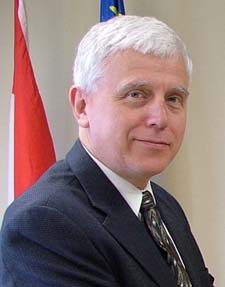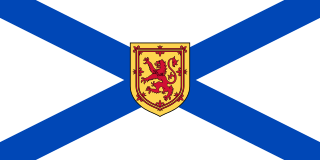John Patrick Savage, OC, ONS was a Welsh-born Canadian physician and politician. Savage was the 23rd Premier of Nova Scotia between 1993 and 1997. He was born in Wales, and educated in both the United Kingdom and Ireland. He immigrated to Canada in 1967 and was a noted family physician in Dartmouth, Nova Scotia. He became the mayor of Dartmouth in 1985, and won re-election twice. He then became the leader of the Nova Scotia Liberal Party in 1992 and stepped down as mayor. In 1993, he defeated the incumbent provincial government and became premier. Savage was a controversial premier, bringing in many reforms in taxation, regional government, and government hiring practices. He resigned as premier in 1997 due to his low approval ratings in public polls. He died of cancer at the age of 70 in 2003. He was the father of Mike Savage, current mayor of the Halifax Regional Municipality.

The 36th Nova Scotia general election was held on August 5, 2003 to elect members of the 59th House of Assembly of the Province of Nova Scotia, Canada. The ruling Progressive Conservative Party, led by Premier John Hamm, was reduced to a minority government.

Robert Lorne Stanfield, was the 17th Premier of Nova Scotia and leader of the federal Progressive Conservative Party of Canada. He was born into an affluent Nova Scotia clothing manufacturing and political family in 1914. He graduated from Dalhousie University and Harvard Law School in the 1930s. Stanfield became the leader of the Nova Scotia Progressive Conservative Party in 1948, and after a rebuilding period, led the party to government in 1956. As premier, he won three straight elections. His government was credited with modernizing the way the province delivered education and medical services. In 1967, he resigned as premier and became the leader of the federal Progressive Conservative Party. He was the leader of the Her Majesty's Loyal Opposition and fought three general elections, losing each time to the Liberals under Pierre Trudeau. He resigned as leader in 1976 and from public office in 1979. In retirement, he lived mostly in Ottawa, and died there in 2003 from complications due to pneumonia. He is sometimes referred to as "the best prime minister Canada never had". As one of Canada's most distinguished and respected statesmen, he was one of several people granted the style "The Right Honourable" who were not so entitled by virtue of an office held.
The Nova Scotia New Democratic Party is a progressive, social-democratic provincial party in Nova Scotia, Canada. It is aligned with the federal New Democratic Party (NDP). It was founded as the Co-operative Commonwealth Federation (CCF) in 1932, and became the New Democratic Party in 1961. It became the governing party of Nova Scotia following the 2009 Nova Scotia election, winning 31 seats in the Legislature, under the leadership of Premier Darrell Dexter. It is the first New Democratic Party in Atlantic Canada to form a government. The party faced electoral defeat in the 2013 election, losing 24 seats, including Dexter's seat. The current leader is Halifax Chebucto MLA Gary Burrill, who is credited with bringing the party back to its left-wing roots, after the centrist policies enacted by Dexter. The party currently holds 7 seats in the Legislature, and had its lowest showing in the popular vote since 1993 during the 2017 Nova Scotia general election.

The Nova Scotia Liberal Party is a socially liberal, fiscally conservative political party in Nova Scotia, Canada. The party currently forms government in Nova Scotia, under the leadership of Premier Stephen McNeil. It has held power in the province since the 2013 election, and the current government led by Stephen McNeil was the first in Nova Scotia to win 2 consecutive majorities since the government of John Buchanan, after the victory in the 2017 Nova Scotia election.

The Progressive Conservative Association of Nova Scotia, commonly called the PC Party, is a moderate, centrist political party in Nova Scotia, Canada. They have been historically associated with the "Red Tory" wing of Canadian conservatism. The party is currently led by Pictou East MLA Tim Houston.
Donald William Cameron was the 22nd Premier of Nova Scotia, Canada, from February 1991 to June 1993. He represented the electoral district of Pictou East in the Nova Scotia House of Assembly from 1974 to 1993, as a member of the Progressive Conservative Party of Nova Scotia. Following his political career, he was appointed as the Canadian Consul General to New England.

The 37th Nova Scotia general election was held on June 13, 2006 to elect members of the 60th House of Assembly of the Province of Nova Scotia, Canada.

Neil J. LeBlanc is a former politician in Nova Scotia, Canada.

The 35th Nova Scotia general election was held on July 27, 1999, to elect members of the 58th House of Assembly of the Province of Nova Scotia, Canada. The government was defeated on a money bill on June 18, and the Nova Scotia House of Assembly was dissolved by Lieutenant Governor James Kinley. It was won by the Progressive Conservative party, led by Dr. John Hamm. They received a majority of 30 seats compared to 11 seats by the NDP and 11 by the Liberals.

The 34th Nova Scotia general election was held on March 24, 1998 to elect members of the 57th House of Assembly of the Province of Nova Scotia, Canada. The Liberal party and the New Democratic Party tied in the seat count, with 19 each, while the Progressive Conservatives won 14 seats. The Liberals went on to form a minority government with the support of the Progressive Conservatives.

The Nova Scotia Liberal Party held a leadership election on April 27, 2007 at the Dartmouth Sportsplex, following the resignation of Francis MacKenzie, shortly after failing to win a seat in the 2006 election. This was the third leadership convention for the Liberals since 2002. It was won by Annapolis MLA Stephen McNeil.
Nova Scotia is a parliamentary democracy. Its legislature consists of the Lieutenant Governor of Nova Scotia and fifty-one members representing their electoral districts in the Nova Scotia House of Assembly. As Canada's head of state, Queen Elizabeth II is the head of Nova Scotia's chief executive government. Her duties in Nova Scotia are carried out by the Lieutenant-Governor, Arthur LeBlanc. The government is headed by the Premier, Stephen McNeil, who took office October 22, 2013. Halifax is home to the House of Assembly and Lieutenant-Governor. The House of Assembly has met in Halifax at Province House since 1819.

The 38th Nova Scotia general election was held on June 9, 2009 to elect members of the 61st House of Assembly of the Province of Nova Scotia, Canada. The government was defeated on a money bill on May 4, and the Nova Scotia House of Assembly was dissolved by Lieutenant Governor Mayann Francis on May 5. thereby triggering an election. The NDP won a majority government, forming government the first time in the province's history, and for the first time in an Atlantic Canadian province. The governing Progressive Conservatives were reduced to third place.
Donald Richard Downe is a farmer and political figure in Nova Scotia, Canada. He represented Lunenburg West in the Nova Scotia House of Assembly from 1993 to 2003 as a Liberal member.
Donald Peter McInnes was a dairy farmer and political figure in Nova Scotia, Canada. He represented Pictou West in the Nova Scotia House of Assembly from 1978 to 1998 as a Progressive Conservative member.
Gordon Howard "Paddy" Fitzgerald was a Canadian politician in the province of Nova Scotia. He was a former Speaker of the Nova Scotia House of Assembly. Fitzgerald was born in Cochrane, Ontario.

The 2013 Nova Scotia general election, formally the 39th Nova Scotia general election, was held on October 8, 2013, to elect members to the Nova Scotia House of Assembly.
Thomas Johnson McInnis is a Canadian senator. He also represented the electoral district of Halifax Eastern Shore in the Nova Scotia House of Assembly from 1978 to 1993, as a member of the Progressive Conservative Party of Nova Scotia.

The 2017 Nova Scotia general election, formally the 40th Nova Scotia general election, was held on May 30, 2017, to elect members to the Nova Scotia House of Assembly.












